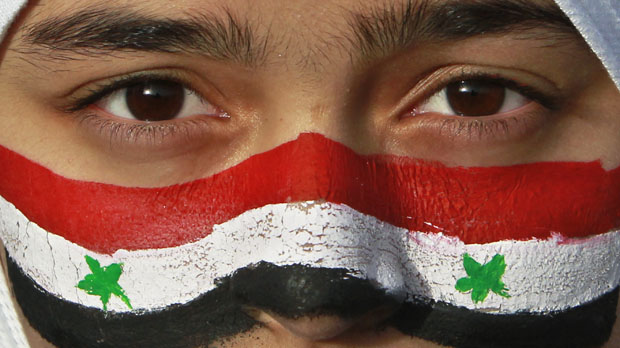Syria protests: ‘forces fire shots at demonstrators’
Syrian forces have fired shots at protesters gathered in Homs, according to reports. And in Damascus, a blogger tells Channel 4 News that medical students have been beaten up by Government troops.
Protesters say Syrian forces opened fire after a member of the police addressed the crowd in Clock Square, Homs city asking them to leave.
The demonstrators occupied the square on Monday demanding political reform. There are conflicting reports about how many people have been injured in the latest clashes.
Read more: Arab revolt and the Middle East uprisings
Several hours earlier, state television in Syria broadcast an interior ministry statement that described the wave of unrest as an insurrection.
Human rights groups say around 200 people have been killed in Syria since the protests began.
In a statement, Foreign Secretary William Hague said:
"I am concerned by the reports of further deaths and casualties in Syria overnight.
"I call on the Syrian security forces to exercise maximum restraint, and on the Syrian authorities to respect the people's right to peaceful protest.
"As I have said before, the Syrian Government should act urgently to respond to the legitimate demands of the Syrian people for political change and move towards implementing much needed reform."
President Bashar al-Assad announced on Saturday that he would end nearly half a century of emergency rule with legislation that should be in place by next week, but his pledge did little to appease protesters calling for political freedoms.
Syrian authorities have intensified bans on independent media since protests challenging the authoritarian rule of Assad erupted more than a month ago.
No independent media is allowed into Homs or other cities witnessing unprecedented pro-democracy demonstrations. Several international journalists have been expelled or arrested.

In the capital of Damascus, “at least” 120 students, many of them studying medicine at the city’s main university, were hospitalised when their peaceful protest was broken up by “troops with clubs,” a prominent Damascus-based blogger told Channel 4 News.
“I have been watching the students all day today: they were very peaceful, no aggression, ” he said.
“And then in the afternoon, maybe 30 soldiers came, as well as thugs not wearing uniforms came, beating people with heavy objects: the back of guns, clubs like policemen have. The students were terrified and it went on for so long. You could hear them screaming from far away, from many blocks away.”
He added: “I know several of the protesters: two were taken to hospital: one with a broken nose, the other a fractured arm, but they are luckier than the others. I hear the hospital is full of the students with very bad injuries.”
President under pressure
Thousands demanded the overthrow of Assad on Monday at the funerals of 17 protesters killed in Homs.
Human rights campaigners said the 17 had been killed late on Sunday during protests against the death in custody of a tribal leader.
“From alleyway to alleyway, from house to house, we want to overthrow you, Bashar,” the mourners chanted, according to a witness at the funeral.
Further north, in Jisr al-Shughour, 1,000 people called for “the overthrow of the regime”, echoing the chants of protesters who overthrew leaders in Egypt and Tunisia, at the funeral of a man who they said had been killed by security forces.
Protests against the authoritarian rule of Assad’s Baath Party erupted in the southern city of Deraa more than a month ago, and have spread across the country.
Read more: the Arab revolt - social media and the people's revolution
The government says Syria is the target of a conspiracy and authorities blame the violence on armed gangs and infiltrators supplied with weapons from Lebanon and Iraq.
Opposition groups say there is no evidence of a conspiracy.
The interior ministry statement said Salafist groups were trying “to spread terror across Syria … using the march of freedom and reform that was launched according to a timetable by President Assad in his guiding speech”.
The demonstrations present the gravest challenge yet to Assad, who succeeded his late father Hafez al-Assad, who died in 2000 after 30 years of rule.
-
Latest news
-
Post Office Inquiry: Chairman intervenes as public gallery scoffs4m

-
Inside Sudan: An unfolding humanitarian catastrophe7m

-
What are the public spending plans for the election promises?3m

-
Michael Matheson faces Scottish parliament suspension over £11,000 iPad bill2m

-
Dudley voters divided on Rishi Sunak’s record as PM13m

-




